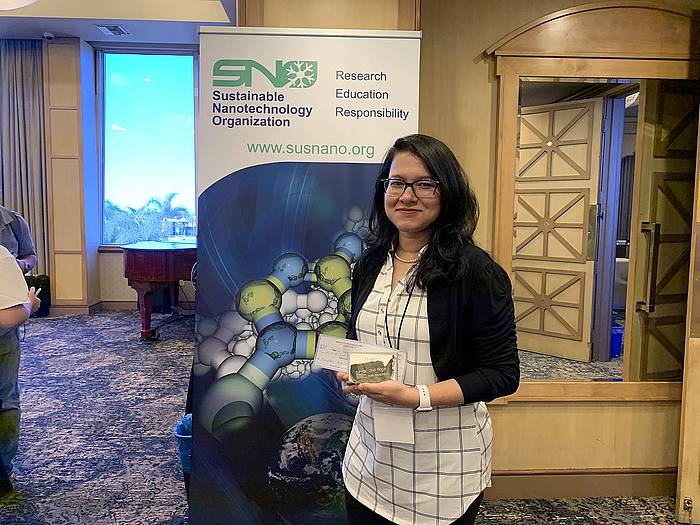
NDSU civil engineering doctoral candidate Umma Rashid was awarded second place in the NanoPitch Competition at the Sustainable Nanotechnology Organization Conference 2019 in San Diego Nov. 7-9.
Rashid presented her research on removing aqueous fluoride from water using ceria-graphene nanohybrids. Nanomaterials are smaller than 100 nanometers. The title of her pitch was “<100 seconds to remove fluoride from water.”
Excess fluoride (1.5 mg/L) in drinking water can lead to dental and skeletal fluorosis.
Rashid works in the research group of Achintya Bezbaruah, associate professor of civil and environmental engineering.
“It is a challenge to explain four years of research in 100 seconds, but that is what is expected of you in NanoPitch,” Bezbaruah said. “The fundamentals of nanoscience and technology are difficult to be conveyed to the public, but we should tell a good story such that people can understand the relevance of our work and how that benefits them. Being in a land-grant university, our work should be relatable to the public and so while we work on the fundamentals, the ramifications of our research are direct benefits to the public. Umma winning this award at an international conference speaks volumes about the research and education efforts here at NDSU.”
Rashid earned a plaque and cash prize for the research pitch. “The framework of this challenge was to pitch a problem related to my sustainable nanotechnology research in a clear and compelling manner. I work with different nanomaterials for groundwater contaminant remediation. I always wanted to check if I can convince people to use nanomaterials to treat water, and this competition gave me the platform to try that out,” she said.
In addition, Rashid and environmental and conservation sciences doctoral candidate Tonoy Das from Bezbaruah’s group presented oral research papers at the conference. Das presented his work on the reliability of groundwater arsenic removal using nanomaterials, while Rashid presented her fluoride research.
The focus of this year’s conference was on sustainable nanotechnology in the 2020s. There were sessions on: Emerging Nanotechnologies for Sustainable Energy; Nanoeducation; Food and Agriculture; Water Treatment and Remediation; Fate, Transport and Exposure; Measuring Nanomaterial Exposure and Effects in Environmental Health Research; Green Synthesis and Green Manufacturing; and Nanomaterials in Indoor Environments.
As a student-focused, land grant, research university, we serve our citizens.





